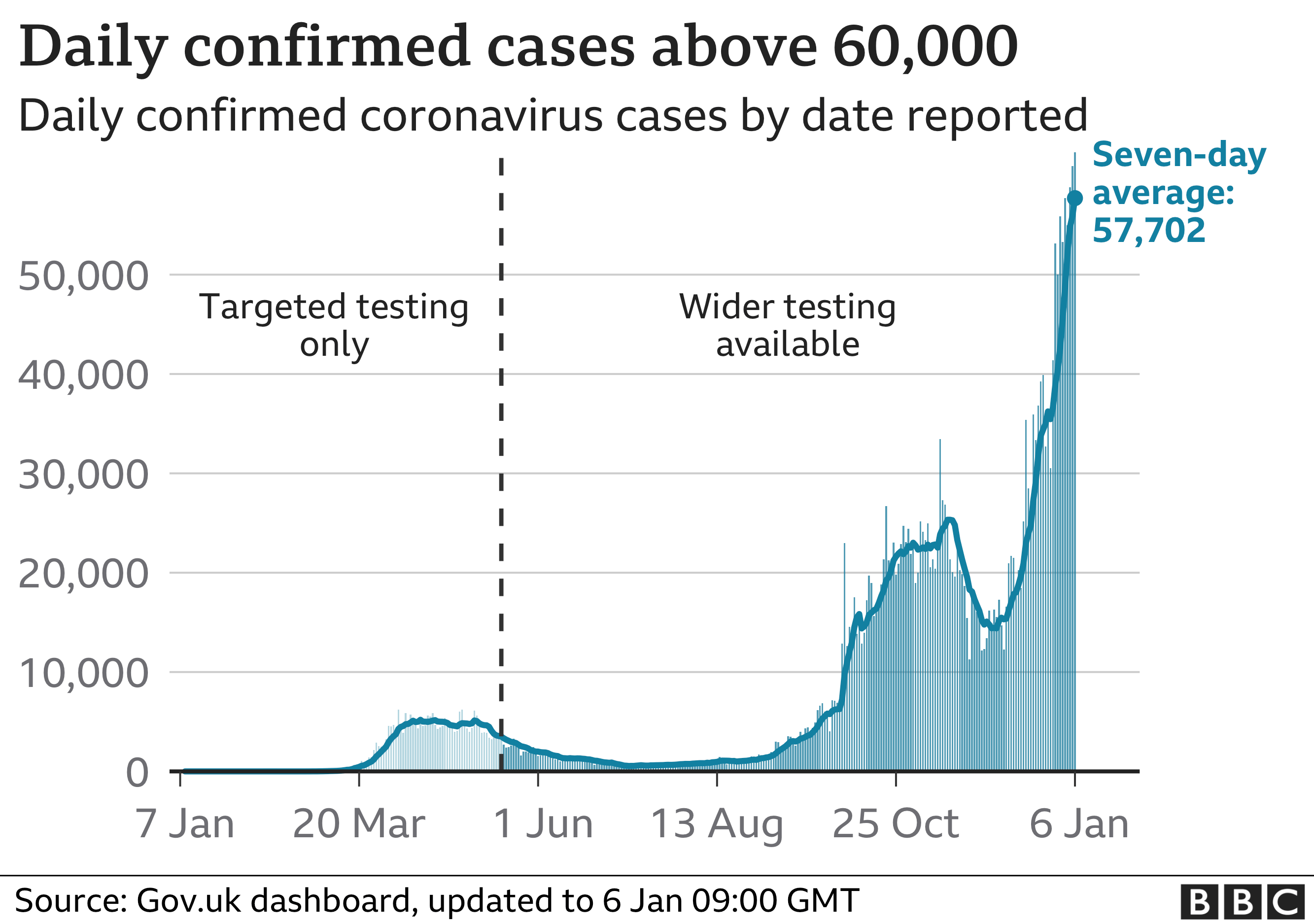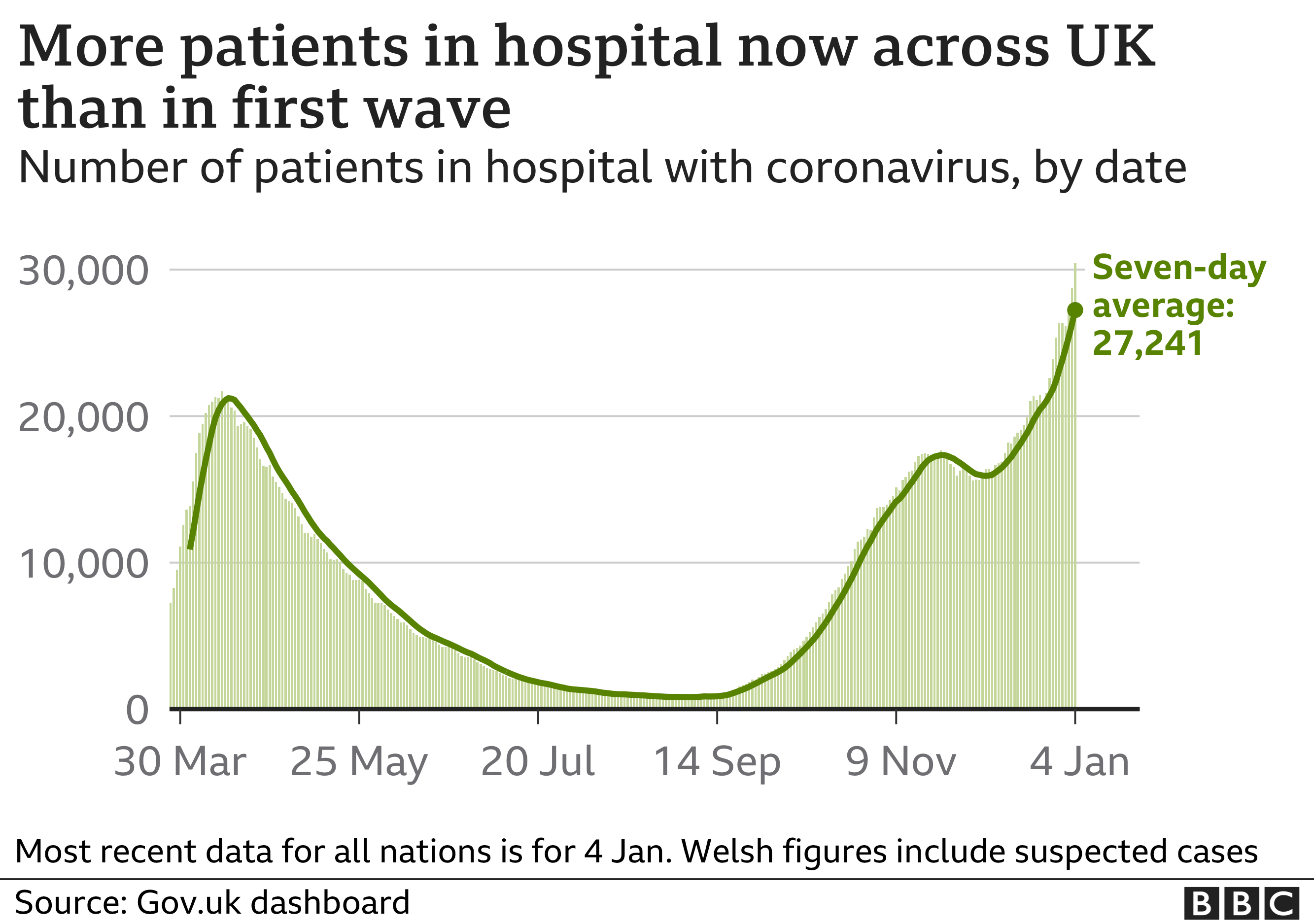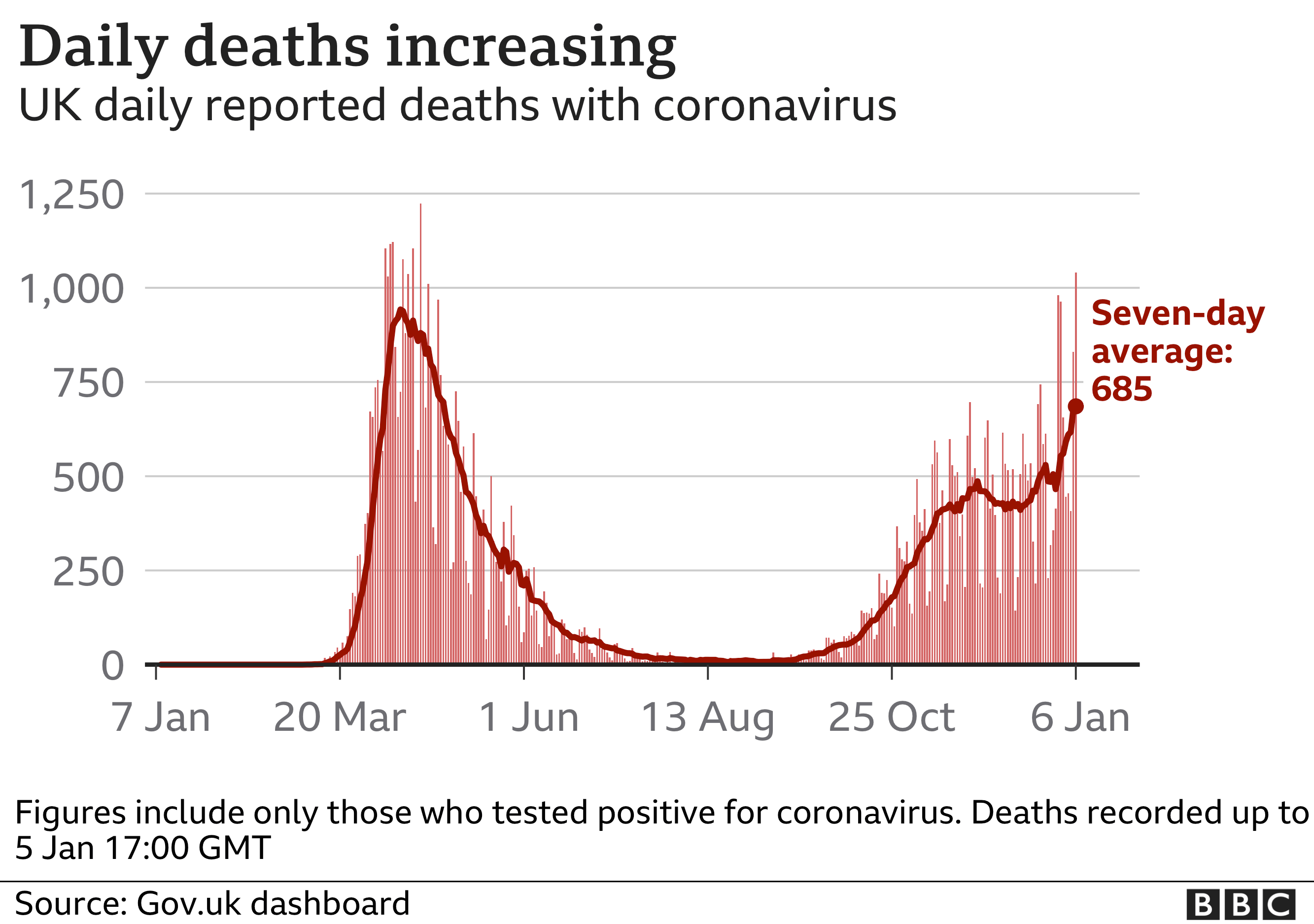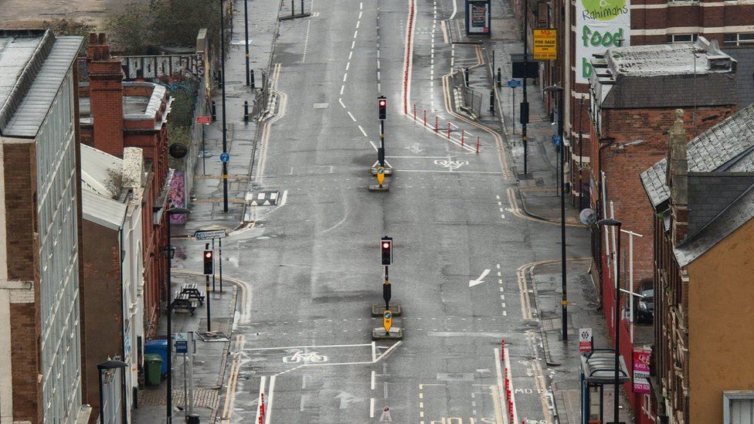The UK has reported a further 1,041 people have died with coronavirus, the highest daily death toll since April.
It came as 62,322 new cases were recorded, the highest daily rise since mass testing began, and as MPs supported England's lockdown.
Health Secretary Matt Hancock earlier said doctors could be forced to ration treatment without the new curbs.
There are 30,074 Covid patients in UK hospitals, he said, as an ambulance trust told of severe pressure.
Current patient numbers are 39% higher than the previous peak on 12 April last year, when 21,684 were hospitalised.
The number of those who died within 28 days of a positive test in the past week is 37% higher than the previous seven days.
Mr Hancock told MPs the consequences of inaction could be similar to scenes elsewhere in the world - of overrun hospitals and doctors choosing "who to treat and who to turn away".
"If we don't act now, we know that eventually the NHS would not be able to cope," Mr Hancock said.
"We know that while the winter weeks will be difficult, we now know what the way out looks like," he added, referencing the accelerated roll out of vaccines.



West Midlands Ambulance Service experienced its busiest-ever day on Monday, handling 5,383 emergency calls due to a combination of Covid-19 pressures and winter weather.
Sussex and Surrey have rolled out "major incident" plans, allowing the two counties to seek more central government support as pressure mounts on health services.
And hospitals in Greater Manchester are in danger of "falling over" as cancer operations risk being cancelled, Manchester City Council's leader Sir Richard Leese said.
All of the UK is now under strict virus curbs, with Wales, Northern Ireland and most of Scotland also in lockdown.
While England's lockdown became law at midnight, MPs voted overwhelmingly - by 524 to 16 - in support of the tougher measures on Wednesday evening.
Speaking during the Commons debate on the new restrictions, Health Minister Helen Whately said although the regulations allowed the lockdown to be in place until the end of March, the government did not expect it to continue until then.
Instead, the plan was for a "steady, controlled and evidence-led move down through the tiers on a local basis" to exit lockdown.
Meanwhile, GCSEs, A-level and AS-level exams will be cancelled this year in England, replaced by a form of teacher-assessed grades, Education Secretary Gavin Williamson said.
"This year, we're going to put our trust in teachers, rather than algorithms," he said, following controversy over the way exam grades were awarded to some students last year.
All national curriculum tests for primary school children, often known as Sats, are also cancelled, Mr Williamson confirmed.
He said that during this lockdown, every school will be expected to provide between three and five hours of virtual teaching each day and that 750,000 laptop and tablet devices will have been distributed by the end of next week.
These numbers will keep rising

The figures are stark. But sadly they were to be expected. Infection rates were climbing throughout December - they are now more four times higher than they were at the start of last month.
More infections, mean more hospital admissions and more deaths.
The fact deaths have gone over 1,000 for the first time since April is alarming.
But one caveat to that is that the figures over the past week have been jumping around because of delays reporting deaths over the Christmas period.
A better way to measure deaths is to look at the average number of deaths over the course of the week. This metric shows we are seeing just below 700 a day - although that is still up by 40% compared to the figure before Christmas.
And these numbers are only going to continue rising. That's because this week's infections are next week's hospital admissions and some of those being admitted then will die maybe a week or so later.
Lockdown is expected to have an impact, but it will take some time - and even then it may have less affect than previous ones because of the more transmissible variant.
The rollout of the vaccines cannot come soon enough.
As MPs debated the new lockdown, Labour's shadow health secretary Jonathan Ashworth called for the government to ramp-up its vaccination programme to six million doses a week.
It came after Prime Minister Boris Johnson told MPs England's new lockdown would not end with a "big bang" but a "gradual unwrapping".
He said that, unlike during the first lockdown from March 2020, vaccines now offered "the means of our escape".
But he said there was a race to vaccinate vulnerable people quickly, with the government setting a target of immunising the four most vulnerable groups - some 13 million people - by mid-February.
"After the marathon of last year, we are indeed now in a sprint, a race to vaccinate the vulnerable faster than the virus can reach them," Mr Johnson said.
"Every needle in every arm makes a difference."
At-a-glance: New rules in England
- People cannot leave their homes except for certain reasons, like the first lockdown last March
- These include essential medical needs, food shopping, exercise and work for those who cannot do so from home
- All schools and colleges will close to most pupils from Tuesday with remote learning until February half-term
- Early years settings such as nurseries will stay open
- End-of-year exams will not take place this summer as normal
- Elsewhere, university students should not return to campuses and will be taught online
- Restaurants can continue to offer food delivery, but takeaway alcohol will be banned
- Outdoor sports venues - such as golf courses, tennis courts and outside gyms - must close
- But outdoor playgrounds will remain open
- Amateur team sports are not allowed, but elite sport such as Premier League football can continue
Vaccines Minister Nadhim Zahawi earlier said he was "confident" the "ambitious" target would be met, adding that community pharmacies would be brought in to assist the vaccination programme.
On Tuesday, Mr Johnson said 1.3 million people in the UK had been vaccinated so far.
The locations for seven mass vaccination centres in England have been announced by the government.
Sites in Stevenage, London, Newcastle, Manchester, Surrey, Bristol and Birmingham will be staffed by NHS workers and volunteers from next week.
Latest Stories
-
GPL 24/25: Dacosta Aboagye’s first half goal secures win for Basake Holy Stars
38 minutes -
Akufo-Addo must take responsibility for NPP’s defeat – Dr. Amoako Baah
43 minutes -
Joy Prime’s Big Chef Junior to unveil 12 contestants for Season 4
52 minutes -
I haven’t sacked anyone – Petroleum Hub CEO clears air
55 minutes -
GPL 2024/25: Asante Kotoko relinquish top spot after heavy defeat to Accra Lions
56 minutes -
Feed Ghana initiative will solve Ghana’s food problems – Casper Kampoli
1 hour -
I would’ve thrown Akufo-Addo out of NPP if… – Amoako Baah
1 hour -
Health Minister cautions heads of training institutions against intimidation tactics
1 hour -
Ghanaians should report drug couriers – Patrick Agyapong
1 hour -
Chief Justice directs registrars to prevent jurors from serving in multiple courts as criminal assizes begin
1 hour -
GPL 2024/2025: Gold Stars defeat Bechem to go top
1 hour -
I’m no longer a member of the NPP – Dr Amoako Baah
1 hour -
UBA Ghana wins Global Brand Frontier Award for Best Bank in CSR and Sustainable for 2025
1 hour -
NPP will not make 2024 election defeat report public – Richard Ahiagbah
2 hours -
Hundreds benefit from Academic City’s health screening exercise
2 hours

